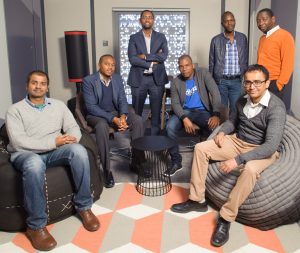Cognitive Computing
Driving Cognitive Research in Johannesburg
August 25, 2016 | Written by: Chris Nay
Categorized: Cognitive Computing | IBM Research
Share this post:
Nearly 100 years ago, IBM established its first operations in Africa, and began playing a vital role in the continent’s economic development – boosting the capabilities of its people and institutions through technical education, training, infrastructure, governance and scientific research.

From left to right, Pavan Kumar Rallabandi, Tapiwa Chiwewe, Solomon Assefa, Fungai Mandikuwaza, Precious Khuthadzo Razwiedane, Darlington Shingirirai Mapiye and Melvin Mathew Varughese (sitting) (Credit: Eyescape Corporate Photography)
In 2013, the company drove deeper into Africa opening its first research lab on the continent, in Nairobi, to develop breakthrough technologies and science, address national priorities and continental grand challenges, and foster a local innovation ecosystem.
Today, IBM is strengthening its commitment even further, cutting the ribbon on its second IBM Research lab on the continent, this time in South Africa. Researchers in this lab will explore the use of cognitive computing, the Internet of Things and Big Data to support South Africa’s national priorities, drive skills development and foster innovation-based economic growth.
As part of a 10-year investment program through South Africa’s Department of Trade and Industry and working closely with the Department of Science and Technology, the new research lab is based at the University of the Witwatersrand (Wits), in Braamfontein, Johannesburg. The school was recently ranked among the top 10 universities in emerging economies by the Times Higher Education World University Rankings.
Braamfontein has long been considered an inner city neighborhood in Johannesburg, but we recognized a transformation taking place. Just a year ago, the area was barren and neglected; today, it’s already much more lively with beautiful buildings coming up and streets cleaned up. By making the decision to plant our roots in Braamfontein’s Tshimologong Precinct, I believe that we, along with our partners at Wits, can catalyze a technology revolution in the city and inspire startups to take root and sprout.
The lab’s three key focus areas will provide wide-ranging opportunities for academic and industry partnerships while addressing South Africa’s biggest challenges: data driven healthcare, digital urban ecosystems and exploring the universe. About a dozen projects are already underway ranging from Tuberculosis tracking, traffic optimization, wildfire risk assessment, and even a partnership with NASA to analyze millions of radio signals from outer space to detect terrestrial interference.
I want people to come into IBM Research – Africa in South Africa and feel surprise and wonder at the unexpected uniqueness of our environment. Our goals are to develop new technologies, advance science, publish, keynote conferences, and unearth discoveries. In doing so, we will embody the long-standing tradition of restless reinvention at IBM, and make a positive difference for the country, the continent and beyond.
Meet the Newest IBM Fellows
Since the first class of IBM Fellows in 1962, IBM has honored its top scientists, engineers and programmers, who are chosen for this distinction by the CEO. Among the best and brightest of IBM’s global workforce are 12 new IBM Fellows who join 293 of their peers who have been so recognized over the last […]
How IBM is Advancing AI Once Again & Why it Matters to Your Business
There have been several seminal moments in the recent history of AI. In the mid-1990s, IBM created the Deep Blue system that played and beat world chess champion, Garry Kasparov in a live tournament. In 2011, we unveiled Watson, a natural language question and answering system, and put it on the hit television quiz show, […]
Amplifying the Power of Debate with AI
French essayist, Joseph Joubert, wrote in 1896: “It is better to debate a question without settling it than to settle a question without debating it.” For the last 15 years, I’ve led the nation’s most popular debate organization, ProCon.org. While our public charity has served more than 180 million people since 2004, our obsession with […]



